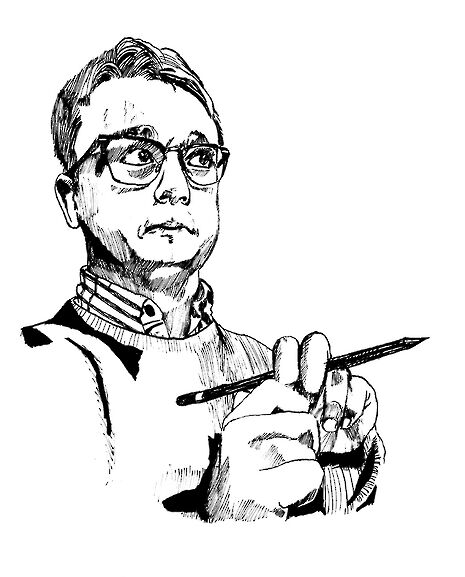Varsity Introducing: Ben Brown
You have to get to the heart of the issue rather than just illustrate it, the cartoonist tells Patrick Wernham

How did you first get into art generally, and then drawing cartoons?
I’ve drawn since before I can even remember. In terms of cartoons, it’s much more recent. This time last year The Tab sent out an email asking for contributors, and right at the bottom there was illustrator; I thought I might as well sign up to that as that’d be pretty cool. I went to the interview, and I think I was the only person to apply! I showed them some illustrations, and they said they’d take me on a fairly informal basis. For my first cartoon, which was really rubbish, the joke was one frame with students running out of exams being sprayed with champagne, and the next had them at the Union garden party being rained on. That was the really terrible joke; luckily I never really bothered finishing it!
What’s the hardest part of drawing a cartoon: is it the concept or the execution?
It can vary. A lot of the time I’ve ended up hanging cartoons on rather lame puns, but generally the best ones come when you’ve actually got a decent joke. Normally a main joke or theme comes first. There was one just after George Osborne had announced his budget, and Iain Duncan Smith resigned. I didn’t really come up with a single joke, but I decided to do a Game of Thrones theme with them stabbing each other in the back. That wasn’t really a single joke. There was one I did more recently about Malia Bouattia, the President Elect of the NUS, based around a single joke which I thought was quite interesting and edgy about anti-semitism. So there are differences in approach. I guess the difficulty comes in trying to make it work as a whole, trying to prevent it from becoming overly messy. Normally I draw them in pencil first, and ink over that. They tend to come fairly easily.
Do you think that a cartoon has a special quality, and can convey something that an article or joke on its own can’t?
Probably not in an intellectual sense! I think it’s more the fact that you have this image that’s really powerful; it can stick in people’s minds. Thinking back through history, the things that really stick in your mind are the images. With the Nazi-Soviet pact for example, or whatever situation, you’ll remember the cartoons. In that way there’s an appeal, and that’s part of the reason one draws cartoons. An image can stick in someone’s head in the way that an article might not be able to.
Do you see yourself more in the vein of a New Yorker-style, light-hearted, cartoonist or a more potent Charlie Hebdo-style one?
You wouldn’t want to be a cartoonist who just takes current events and in some way tries to graft them bluntly onto an image. I think you have to try and get to the heart of the issue, rather than just illustrate it. Newspaper cartoonists are under pressure to come up with one a day, whereas I only tend to do one every two weeks, and that probably does play its part. But ultimately I would prefer to draw a cartoon that is truly memorable rather than ones that just help to pass the day by!
How far do you agree with controversial cartoonists like Charlie Hebdo who set out to deliberately provoke?
I would be very annoyed if it just became about drawing Mohammed, as was the case with Charlie Hebdo, as a kind of protest in the name of free speech. I think that’s being gratuitously disrespectful. But at the same time it would be very wrong to restrict cartoonists too much. A lot of the arguments are about whether other newspapers should print these cartoons after the original has caused controversy, which I found odd, because anyone who wants to can see them. I think the potency of imagery can be dangerous, and can be used not always in good ways.
Why do you think it is that people react so strongly to cartoons?
I think there’s something innate about imagery; it really does stick in one’s mind. You can get irony out a lot better with cartoons, and parody, for example, with works of art, through depicting certain politicians as grotesque monsters. I find it difficult to stay. Images can say something that words on paper can’t.
 Comment / Anti-trans societies won’t make women safer14 November 2025
Comment / Anti-trans societies won’t make women safer14 November 2025 Comment / Be mindful of non-students in your societies12 November 2025
Comment / Be mindful of non-students in your societies12 November 2025 News / Controversial women’s society receives over £13,000 in donations14 November 2025
News / Controversial women’s society receives over £13,000 in donations14 November 2025 News / Stolen plate returned to Caius after 115 years12 November 2025
News / Stolen plate returned to Caius after 115 years12 November 2025 Theatre / The sultry illusions and shattered selves of A Streetcar Named Desire13 November 2025
Theatre / The sultry illusions and shattered selves of A Streetcar Named Desire13 November 2025








